
by Tara Wambugu | Feb 11, 2016 | 2016, Africa, Kenya, Tara Wambugu, World Motherhood
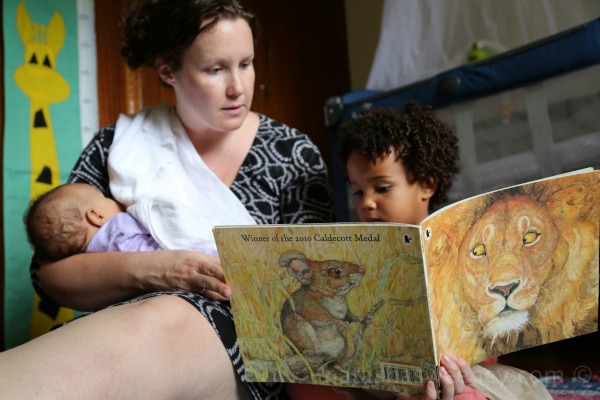
We are big readers in our house, and we have proudly curated a wonderful collection of books for our girls. Both my husband and I want to be sure that our children are strongly exposed to both Kenyan and American culture, so we have made sure we have plenty of books in our collection about life in Kenya and Africa at large. Here are a few of our favorites!
For You are a Kenyan Child, by Kelly Cunnane and Ana Juan
For You are a Kenyan Child is a lovely story about a Kalenjin boy who lives in a rural Kenyan village. He has been given the job of minding his grandfather’s cattle for the day, but he becomes so distracted by all the goings-on in the village that he loses track of the herd. My eldest daughter loves the part when the boy realizes he’s lost track of his grandfather’s cows, and he imagines all the trouble they may have gotten into. I love when he almost knocks down a beautiful Pokot girl and a plump mama carrying mangoes while trying to get back to the grazing cows. Luckily, his wise grandfather knows just where to find them! The illustrations in this book are truly beautiful, and we just love the story.
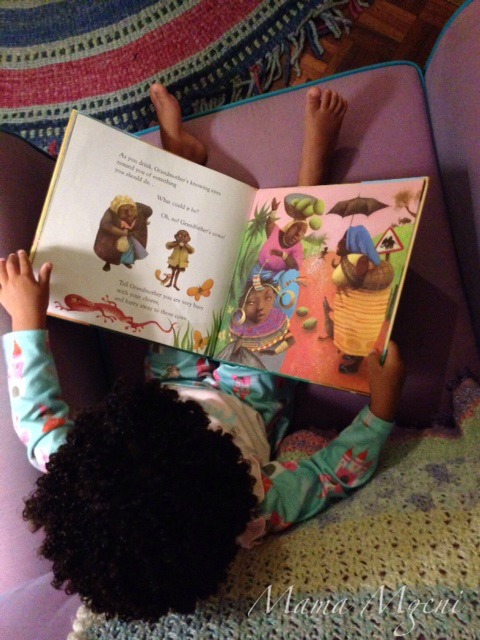
Chirchir is Singing, by Kelly Cunnane and Jude Daly
Chirchir is Singing is the story of Chirchir, a young Kalenjin girl who loves to sing, and wants to help her family with all their work. She tries to help her mother bring water from the well, but drops the bucket. She tries to help her grandmother make the tea, but accidentally puts out the fire. She tries to help her sister mud the floor, but sneezes and makes a mess. Slowly, Chirchir stops singing, and her smile turns to a frown. But soon she finds exactly how she can help, and her family realizes just how wonderful her singing is.
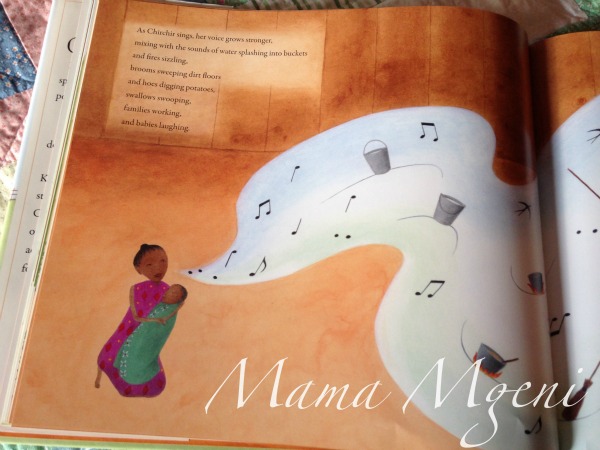
Moja Means One, by Muriel Feelings and Tom Feelings
Moja Means One is a simple Kiswahili counting book, and it’s great for even very young children. It not only teaches children how to count to ten in Kiswahili, but it also describes important African cultural practices, like the way mothers carry their babies on their backs in a simple cloth, the oral tradition of storytelling in the rural villages, and different kinds of traditional African clothing. Both of my children are learning Kiswahili from their father, but it’s so nice to have a book that emphasizes their African heritage!
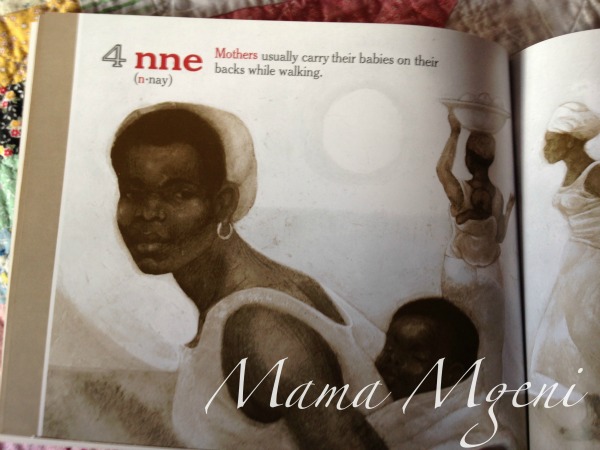
Lila and the Secret of Rain, by David Conway and Jude Daly
This is the story of a young girl in a rural Kenyan village afflicted by drought. The sun beats down on the village, and it is too hot to gather firewood, too hot to weed the garden, and too hot to milk the cow. Young Lila learns from her grandfather the secret of the rain, and she sets out to save her village and bring the rains. She climbs the highest mountain she can find, and begins to tell the sky the saddest things she knew. At last, she laments that without water, there can be no life, and her village is at risk. The sky grows darker, full of Lila’s sadness, and the rain begins to fall. Only Lila and her grandfather know the secret of what brought the rains.
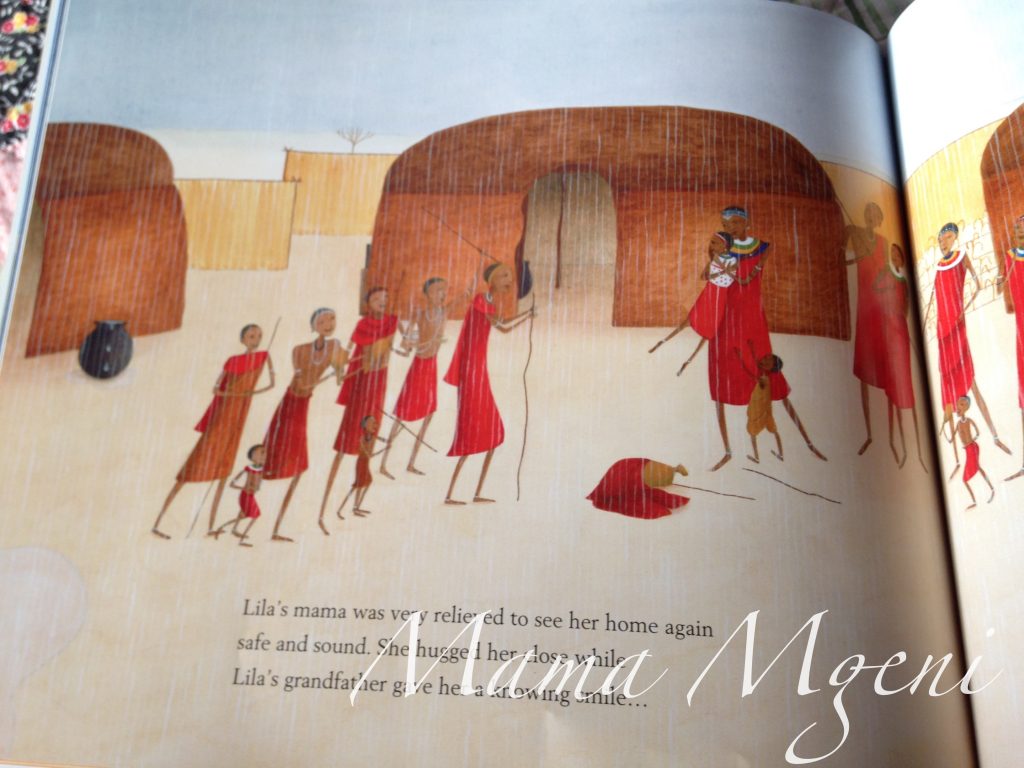
Into the Bush, by Sandra Arensen
Into the Bush is a story is about a young girl named Lilee and her adventures on safari with her family. The tale is vividly told – you can almost hear the sound of the hyenas crunching on bones, or the snap of the crocodile’s jaws in the river below. What I love most about this book are the amazing illustrations. Sandra Arensen does her own artwork using watercolors, and her use of striking lines and vibrant color reminds me of spectacular stained glass windows. My children love the story and the illustrations, and my eldest always talks about her own safari experiences when we read it!
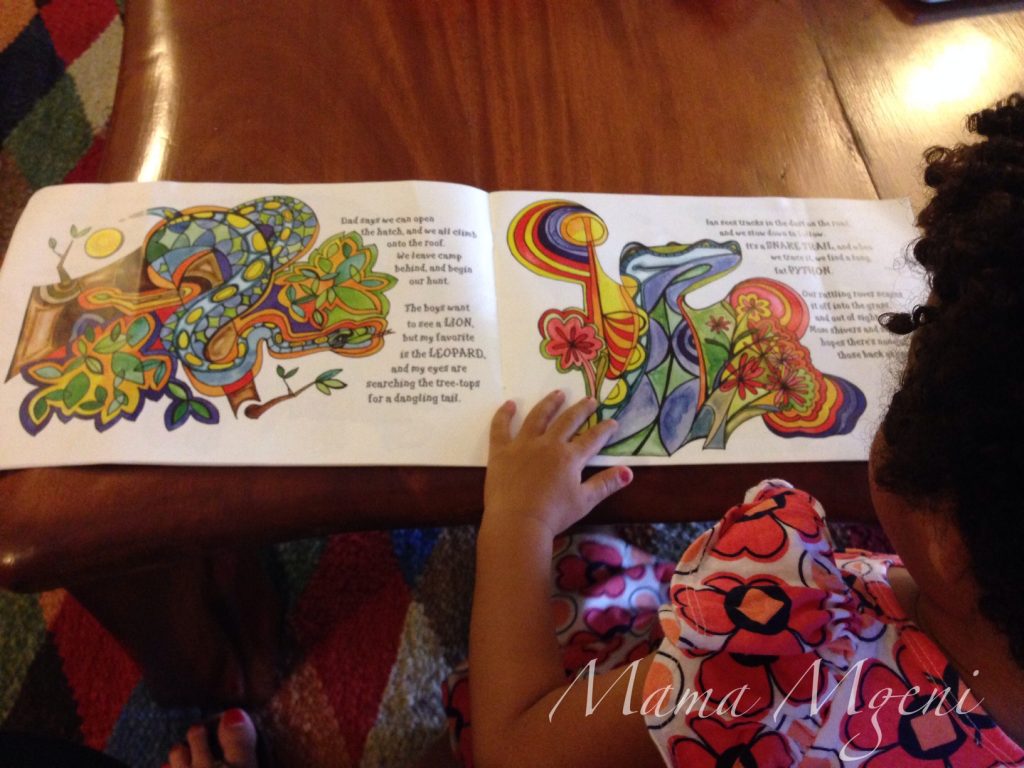
“Into the Bush” isn’t available online, but you can send an email to the publisher at editorial@oldafricamagazine.com, if you are interested in purchasing it. The cost of $10 USD covers the book and shipment in the USA. Please let them know what country you are in, so they can give you the proper pricing!
The Lion and the Mouse, by Jerry Pinkney
Jerry Pinkney illustrated his beautiful adaptation of Aesop’s famous fable about acts of kindness. There are no words in this book – it is up to parents to narrate the story based on the powerful illustrations. We all know the tale: a fierce lion decides to spare the life of a timid field mouse who wakes him from his sleep. Later, the tiny mouse comes to the lion’s rescue, freeing him from a poacher’s net. The moral of the story, of course, is that no good deed goes unrewarded, and that all creatures – great and small – can help one another.
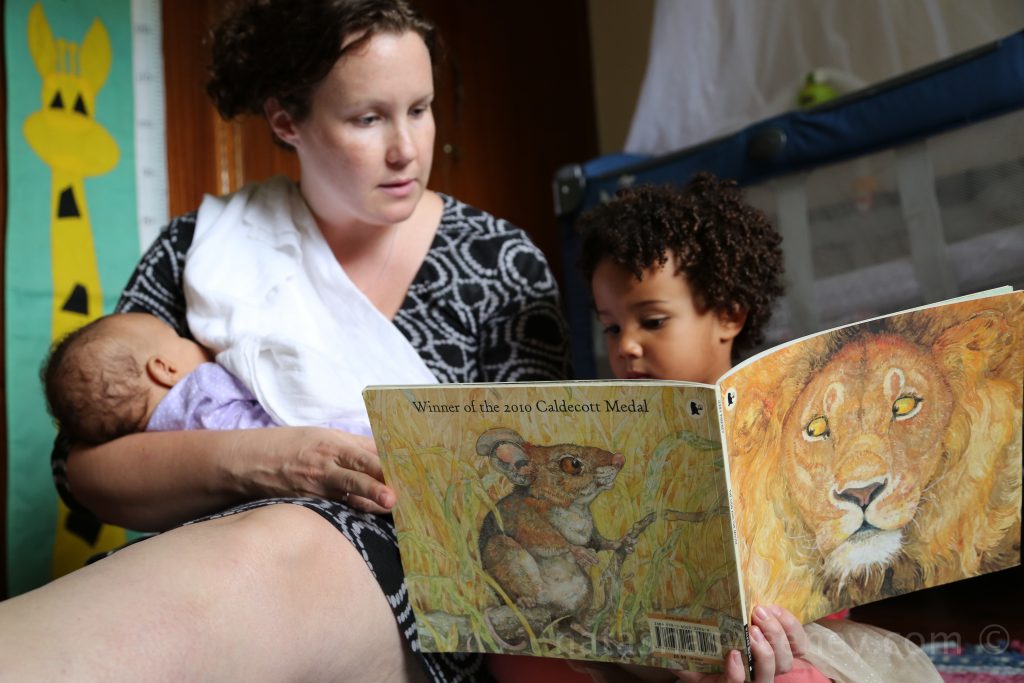
Safari ya Angani, by Francis Atulo
This is a story of the once-beautiful tortoise who wished to fly with the crows into the sky to eat the clouds. One day, the crows carry him up into the sky, as the tortoise sings, “Tunaenda kula mawingu,” (We’re going to eat the clouds!). But the crows lose their grip, and the tortoise falls down to Earth, landing on his back and cracking his beautiful shell. This story is told in simple Kiswahili, and our girls love to sing with the tortoise!
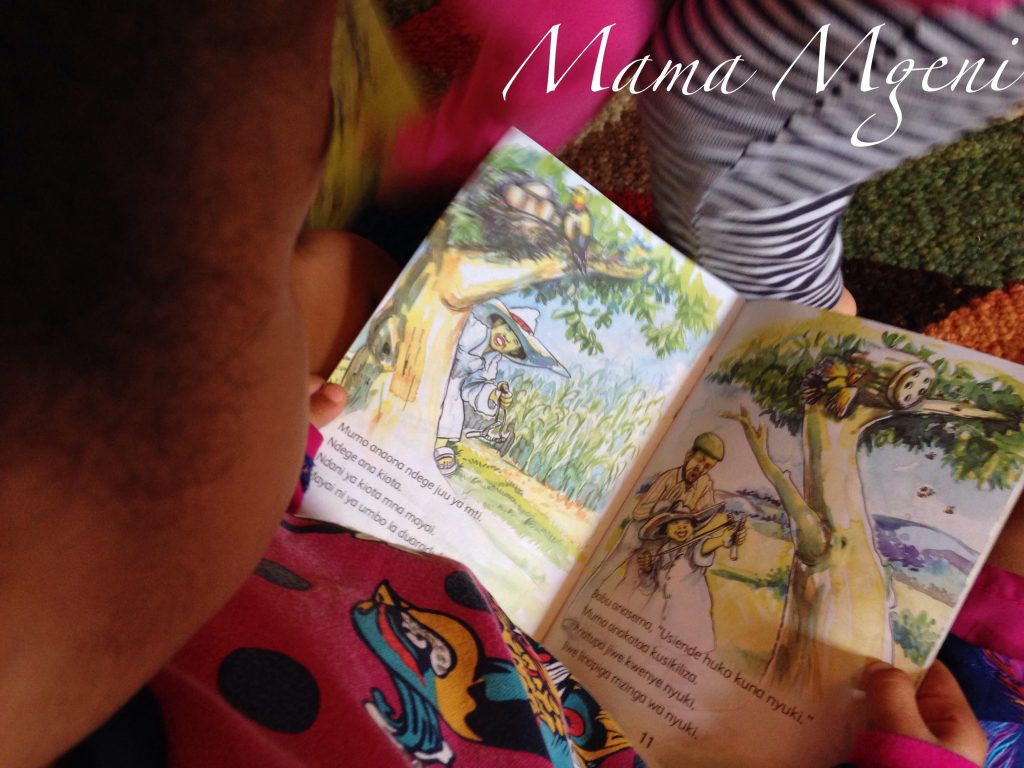
Opulo Aenda Safari by Frank Odoi
The story of a rat named Opulo, who used to have a beautiful, fluffy tail and a nice Maasai blanket to wear on his shoulder. But Opulo is stubborn, and he refuses advice from friends when he sets off on a journey. He winds up walking straight into a thunderstorm, and ultimately loses both his beautiful clothing and his fluffy tail, and learns an important lesson.
Shambani kwa Babu by Hassan Makombo
The story of a young boy named Mumo who goes to the village to visit his grandparents. While helping his grandfather in the garden, he shoots at a bird’s nest with his slingshot, and disturbs a nest of bees. His wise grandfather quickly fans the fire, and uses the smoke to chase away the bees, and Mumo learns an important lesson.
We want our children to see themselves in the books we read, and these tales of life in Kenya definitely give our kids a chance to identify with their Kenyan culture and heritage. Since we live in Nairobi, the capital city of Kenya, our girls aren’t always exposed to traditional life in the rural villages. We love the traditional tales spun in these stories!
Do you read your children stories about their native country and culture? What are your favorites?
This is an original post to World Moms Blog by Tara Wambugu. Follow Tara and her family’s adventures on her blog, Mama Mgeni, and connect with her on Facebook and Twitter.
Photos for The Lion and the Mouse by Natasha Sweeney, used with permission. All other photos credited to the author.
Tara Wambugu is a wife, a mother of two, and a Kenya-based lifestyle blogger covering parenting, family life, travel, and more. A former aid worker, Tara has worked in various countries in Europe, Central Asia, Africa, and Central America. She is now a stay-at-home mom living in Nairobi with her husband and their two sassy little girls. You can follow Tara and her family’s adventures on her blog, Mama Mgeni.
More Posts - Website
Follow Me:






by Maryanne W. Waweru | Jan 15, 2016 | 2016, Africa, Kenya, Maternal Health, World Motherhood
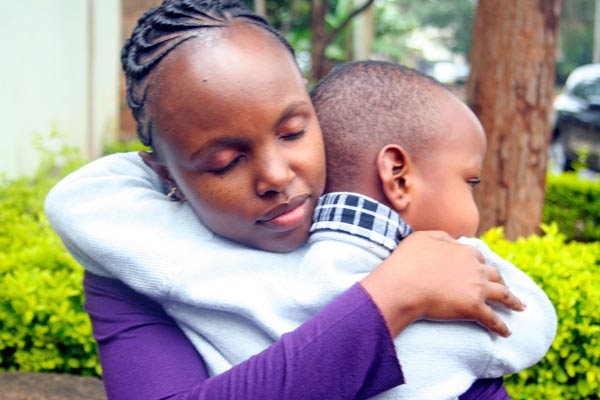
World Mom, Maryanne W. Waweru, and her son.
I began blogging when I was eight months pregnant with my first son, in March 2011. As a 32 year-old who had worked in both, the media and the development fields, for a decade, I considered myself ‘very well-knowledgeable about stuff’ and thought I knew all there was to know about pregnancy and motherhood.
But in those eight months, I had soon discovered that I really didn’t know much. This is because I would always have so many questions about the pregnancy – very simple, but yet, difficult questions that not even the internet could answer. At each gynecologist’s appointment, I would always have tens of questions for my doctor who thankfully was patient enough to answer them all.
But even then, there are questions that the doctor could not answer satisfactorily. I needed to hear from someone who’d gone through what I was going through, and hence, I would find myself asking many mums about their experiences and if what I was going through was normal – you know – the weird cravings, the forgetfulness, the clumsiness, the sleepiness and extreme laziness that I felt. Had they also gone through the same, or was there something wrong with me?
As the pregnancy neared the end, I asked them about their birth experiences, and if they, too, had felt anxious about labor, and how they had dealt with this fear. It always felt better having their support in my journey to motherhood.
Then my son came in April 2011. That was when it really dawned on me that it does indeed take a village to raise a child. Motherhood comes with no manual, and new motherhood can be completely confusing and overwhelming –especially if you don’t have a good support network.
My mum, mother-in-law, sisters, aunts, cousins and friends were on my speed dial as I asked them hundreds of questions a day. Then there was also my paediatrician, too, who thankfully, would also always offer the expert bit.
When I started my blog, Mummy Tales, at home in Kenya, it was about my own motherhood chronicles, but as my readership grew, my inbox would be filled with pregnant women and new mums asking me the same questions that I, myself, had asked when I was in their situation.
And the more my blog grew, the more women wrote in about their experiences with fertility struggles, miscarriages, still births, neonatal sepsis and more. Some I would answer, while others I would get the answers from doctors then share the responses with my readers.
With time, readers began sending me their experiences, asking me to post on my blog for the benefit of fellow women and mums.
This exchange of information enriched me too, and I realized that many women had undergone unfortunate pregnancy and childbirth experiences because they lacked adequate information. I remember one woman who had lost her pregnancy at 25 weeks due to high-blood pressure issues.
“It was only after I saw a story on your blog about a young woman who had died from eclampsia that I came to understand that I had actually been lucky to survive. In my next pregnancy, I paid more attention to everything I was going through, religiously attended all my antenatal clinics and paid attention to my pressure and urine levels during each visit, unlike before. I also became very keen on unusual swelling on my face, hands and feet. This time round, I asked the nurses many questions unlike in my first pregnancy. Even though I still developed pre-eclampsia again, I knew both my baby and I would survive because I was more informed. I was put on medication until the end of my pregnancy, and delivered a healthy baby. Thank God I had become more knowledgeable because of the article I read on your blog,” she told me.
Some of the most common questions I receive on my blog are about the warning signs in pregnancy, foods to eat and avoid during pregnancy, how to prepare for the birth experience and how to generally maintain a healthy pregnancy. I also get lots of questions about breastfeeding, weaning and baby’s nutrition. The answers I give come from my own personal experiences, the experiences of fellow readers, as well as the input of experts.
My blog today is an information hub with real-life practical experiences of motherhood. The ‘tales’ are relatable and as an online community, we are raising our children together, learning together, saving lives of both, mothers and children, and raising healthy babies together. My goal is to ensure that women and babies survive pregnancy and childbirth, and that mothers go on to enjoy the blessing of motherhood, by putting authentic information in their hands.
This is an original post to World Moms Blog by World Mom, Maryanne W. Waweru of Kenya of Mummy Tales.
Photo credit to the author and World Moms Blog.
Maryanne W. Waweru, a mother of two boys, writes for a living. She lives in Nairobi, Kenya with her family. Maryanne, a Christian who is passionate about telling stories, hopes blogging will be a good way for her to engage in her foremost passion as she spreads the message of hope and faith through her own experiences and those of other women, children, mums and dads. She can be found at Mummy Tales.
More Posts - Website

by Tara Wambugu | Nov 5, 2015 | 2015, Culture, Kenya, Tara Wambugu
There’s a lovely naming culture practiced by the Kikuyu tribe here in Kenya: the the first-born son is named after the paternal grandfather, the first-born daughter is named after her paternal grandmother, and so on. My husband is Kikuyu, and we decided to adopt this tradition for our girls’ middle names.
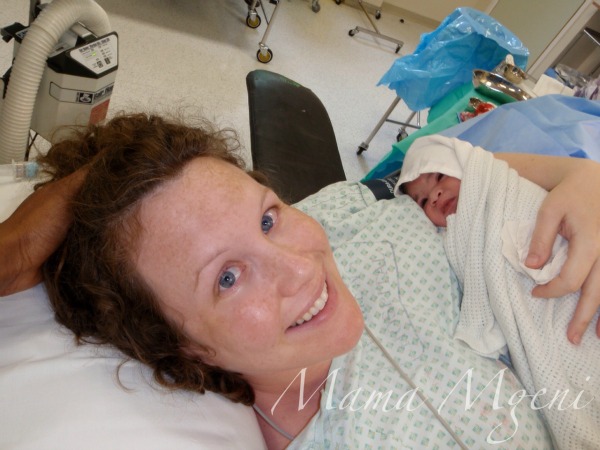
Claire, our eldest child, was given Nyambura as her middle name, after my husband’s mother. Nyambura means “born during the rains.” Since Claire was born in the U.K., we think her name is beautifully befitting! The second-born daughter would traditionally be named after her maternal grandmother, but we really wanted both girls to have Kenyan middle names. When Heidi was born, we decided to give her the middle name Makena, which means “the happy one.” Her name also fits her perfectly.
There are over 40 tribes in Kenya, with very different cultures and traditions. After choosing to name our girls with traditional Kenyan middle names, I was curious about the naming traditions of other tribes. I reached out to the mothers in a local online parenting group here in Nairobi to ask about their own tribes’ naming traditions.
Several tribes follow the tradition of naming their children according to the time of day the child was born. A boy named Otieno was likely born at night. The name Chebet is for a girl who was born at midday when the sun is at its highest point. A boy with the name Kerotich may have been born in the early evening, when the cattle come back to the corral.
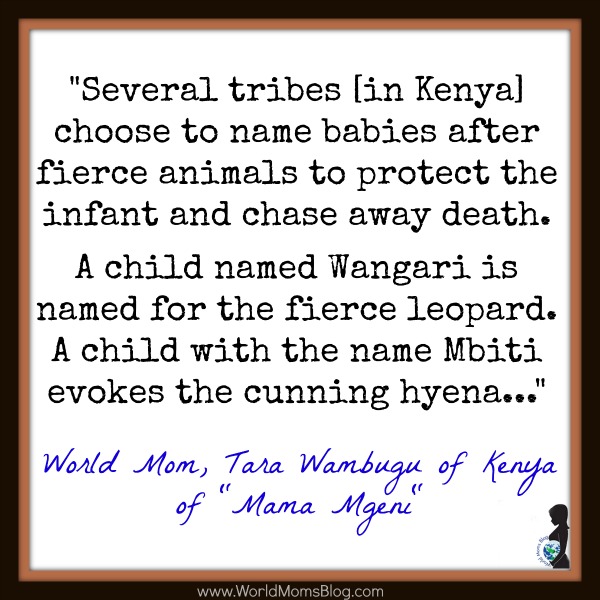
Many tribes practice naming their children after events or circumstances surrounding the child’s birth. In this tradition, the name Okello is for the first baby boy born after twins. Cheruto is a girl’s name for a child born away from the family’s traditional homeland. The name Aoko signifies a child born outside. The name Nyanchera is for a child who was born on the way to hospital.
Several tribes also share the custom of naming babies after the seasons. The name Akeyo signifies a child born during the harvest. The name Kipkemei is for a child born during the dry season. Nanzala is a girls’ name for a child born when there is famine.
Several tribes choose to name babies after fierce animals to protect the infant and chase away death. A child named Wangari is named for the fierce leopard. A child with the name Mbiti evokes the cunning hyena. A boy called Njogu is named for the mighty elephant.
I loved learning about all these beautiful traditions for naming your baby!
I think it’s so wonderful that a name can tell a story, and can carry with it the memory of generations of ancestors. Some even believe that a baby’s name will have a strong influence on the child’s eventual personality.
I am so happy that both of our girls have beautiful, meaningful Kenyan names!
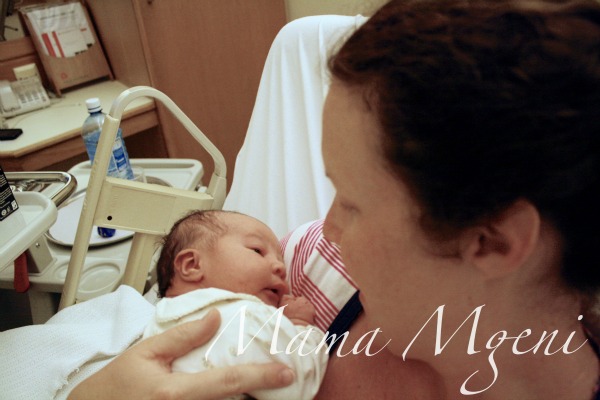
What are the cultural practices for naming babies where you come from? Did you follow a cultural tradition when naming your own children?
This is an original post to World Moms Blog by Tara Wambugu. Follow Tara and her family’s adventures on her blog, Mama Mgeni, and connect with her on Facebook and Twitter.
Photo credits to the author.
Tara Wambugu is a wife, a mother of two, and a Kenya-based lifestyle blogger covering parenting, family life, travel, and more. A former aid worker, Tara has worked in various countries in Europe, Central Asia, Africa, and Central America. She is now a stay-at-home mom living in Nairobi with her husband and their two sassy little girls. You can follow Tara and her family’s adventures on her blog, Mama Mgeni.
More Posts - Website
Follow Me:






by Maryanne W. Waweru | Oct 29, 2015 | 2015, Advice, Africa, Culture, Kenya, Traditions, World Motherhood
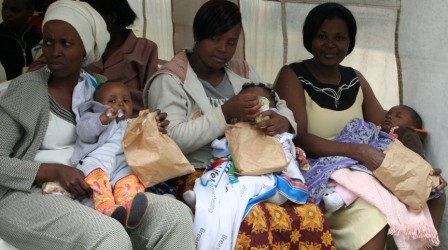
Last Sunday, my closest friend became a mother for the first time. It has been excitement galore from all the people who know her: her family, her friends, her colleagues, neighbors, acquaintances, and just about everybody.
When I visited her in hospital, I found myself giving her all kinds of advice about motherhood from breastfeeding, to weaning, to walking, to teething, all that and more.
Then I quickly told her that I would add her to some Facebook groups that would be of great help to her as a new mum. I began by adding her to a group that is exclusive to Kenyan mums who are breastfeeding. As I did so, I amused myself at how Kenyan mums have turned Facebook into their go-to resource center.
There are plenty of Facebook groups by and for Kenyan mums whose membership constitutes a certain phase of the motherhood journey.
For example, when one is trying to conceive, there is a group to join. When she conceives, she then swiftly moves on to a group for pregnant mums. Once she has her baby, she moves on to the next group –that of breastfeeding mums. After that its a group dedicated to weaning, and where nutrition advice is offered –by fellow mums.
Then there are also larger groups made up of Kenyan mums with babies of whatever age, a general group where everything about motherhood is discussed. From schools, to detergents, to diapers, to cooking fat, tissue paper, to the very critical issue of house girls (nannies). Everything goes. Each of these groups have thousands of members, with one even having slightly over 90,000 members!
I have been in all of these groups, and I am still members in some of them.
In the traditional African setting of the past, new mums were guided into the motherhood journey by the older women around them: their mothers, their aunts, their grandmothers, older cousins and female neighbors.
However, in today’s society some of these traditional fabrics are slowly ebbing away.
More women have to work to supplement the family income, which leaves little option for staying at home to look after the children. In fact, we are seeing less and less of the special interactions between generations of women when it comes to raising her child.
Consequently, we are turning to our friends, our online friends, most of them strangers, for advice that would otherwise have been given to us by our ‘African mothers.’ Combine that with modern technology where access to the internet in many African urban cities is growing, and accessing information and connecting with mums online becomes inevitable.
Sometimes when I think about it, I believe it’s unfortunate, especially for those of us who live in the urban towns, that we no longer have easy access to those traditional pieces of motherhood advice that we would have received directly from our mothers. But, in turn, we are grateful about how the internet has made our parenting journeys significantly easier for our modern lifestyles. Because, it truly has. But, it is only natural to wonder if we may be missing out on something lost.
How has online motherhood support played into your experience as a mother?
This is an original post to World Moms Blog by contributor Maryanne W. Waweru of Kenya.
Photo credit of Kenyan women to the author.
Quote image credit to World Moms Blog.
Maryanne W. Waweru, a mother of two boys, writes for a living. She lives in Nairobi, Kenya with her family. Maryanne, a Christian who is passionate about telling stories, hopes blogging will be a good way for her to engage in her foremost passion as she spreads the message of hope and faith through her own experiences and those of other women, children, mums and dads. She can be found at Mummy Tales.
More Posts - Website
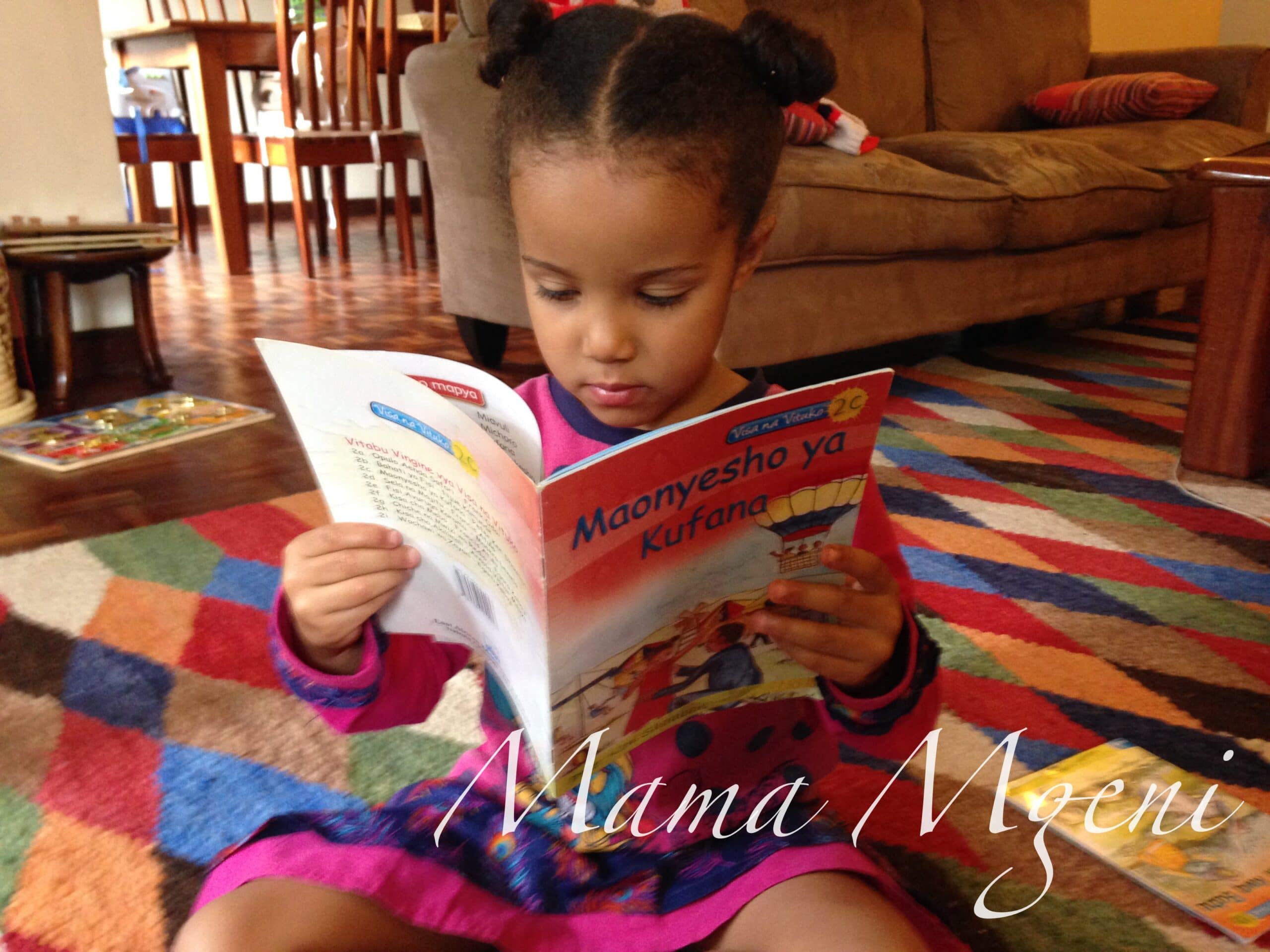
by Tara Wambugu | Jul 21, 2015 | 2015, Africa, Bilingual, Kenya, Language, Tara Wambugu, World Moms Blog, World Motherhood, Younger Children
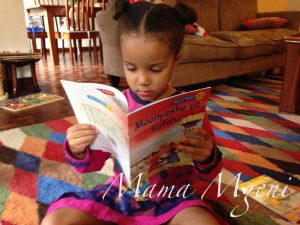
Learning Swahili
I have every reason in the world to learn Swahili. It’s one of the mother tongues of my husband’s (though Kikuyu is his real mother tongue, as he will tell you). It’s one of the official languages of the country, I call home. And a few years ago, a new compelling reason came along: our first-born child. We’re raising both of our kids to be bilingual, following the OPOL (One Parent One Language) approach.
I speak to the kids in English, while my husband speaks to them in Swahili. Our youngest daughter is just starting to use her first words – a smattering from both languages. Our eldest daughter is now 4 years old, and while she favors English when speaking, she understands nearly everything that she hears in Swahili.
It was difficult at first for my husband to speak Swahili with our newborn daughter. It didn’t feel natural to him, since our shared language has always been English. He had to constantly remind himself, and would often stop mid-sentence to repeat what he had said in Swahili. He told me that he didn’t want to say things to the kids that I couldn’t understand. But having my husband speak to our children in Swahili was probably the best thing for my own budding ability.
I have found that by listening to my husband speak simple Swahili to the children, I have begun to learn the language the way native-speaking children learn it: starting with the basics, slowly building with grammar and vocabulary. I may not be able to contribute to a political discussion around the dinner table with the extended family, but learning the language with my children has certainly increased my understanding of what’s being said around me, on the whole.
Listening to my husband read Swahili bedtime stories aloud to the kids has also helped my own language skills.
I find that random lines from the stories will start to swirl around in my head, subconsciously. There is something useful in listening to the same strings of words over and over, committing them to memory, even if by accident.
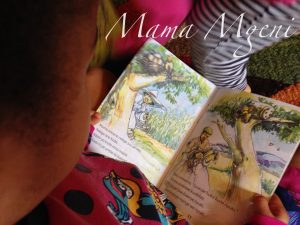
Learning Swahili
While nearly everyone we meet in Nairobi speaks English, learning Swahili with my kids has definitely helped me to communicate better with the people in our community that we see every day. Simple words like where (wapi), how many (ngapi), up (juu), and down (chini) actually come in quite handy when speaking to the staff at the greengrocer or to the attendant in a crowded parking lot. Furthermore, people are delighted when they see that I’m making an effort, and even more delighted when they see the children speaking in the local language.
It is so important to us that our children grow up speaking and understanding both of our mother tongues. And if I’m able to improve my rusty Swahili skills along the way, all the better!
Are your kids growing up in a multilingual household? Have you ever learned a new language with your children?
This is an original post to World Moms Blog by Tara Wambugu, our new contributor from Kenya.
Tara Wambugu is a wife, a mother of two, and a Kenya-based lifestyle blogger covering parenting, family life, travel, and more. A former aid worker, Tara has worked in various countries in Europe, Central Asia, Africa, and Central America. She is now a stay-at-home mom living in Nairobi with her husband and their two sassy little girls. You can follow Tara and her family’s adventures on her blog, Mama Mgeni.
More Posts - Website
Follow Me:






by Tara Wambugu | Jun 17, 2015 | 2015, Africa, Family, Kenya, Living Abroad, Motherhood, Parenting, Tara Wambugu, World Interviews
Where in t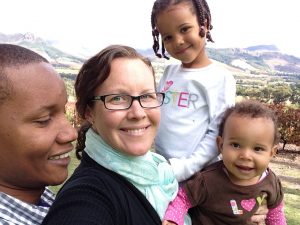 he world do you live? And, are you from there?
he world do you live? And, are you from there?
I live in Nairobi, Kenya. I was born and raised in the US, but I’ve been living abroad for the better part of the past 15 years.
What language(s) do you speak?
English is my mother tongue, and I speak fluent French, as well as (very) basic Kiswahili.
When did you first become a mother (year/age)?
I first became a mother in 2011 when I was 34 years old. I now have two daughters.
Are you a stay-at-home mom or do you work?
Much to the surprise of many of my friends and former colleagues, I decided to stay home with my kids. I feel incredibly lucky to have been able to stay home with them, and being their mom is the most rewarding (and challenging!) job I’ve ever done.
Why do you blog/write?
I started blogging a couple of years after I moved to Nairobi. As I settled in to my adopted home, I realized that I had gained a great deal of insider information about raising a family in Nairobi. A good friend often asked for my advice about life with kids in Kenya and frequently told me, “You should start a blog!” I finally listened to her, and Mama Mgeni was born. “Mgeni” is a word in Kiswahili meaning foreigner, guest, visitor or stranger. I might still be mgeni, but Kenya has very much become my home!
What makes you unique as a mother?
To be honest, I don’t feel very unique. Like all mothers, I adore my children, I can be driven completely mad by my children, I want the best for my family, and I often fear that I’m messing it all up. Motherhood brings us all together, no matter what culture we’re from or what part of the world we live in.
What do you view as the challenges of raising a child in today’s world?
Today’s families have very fast-paced lives, with a constant onslaught of electronic entertainment. It can be a huge challenge to slow down and do things together as a family, without being distracted by phones, computers or TV. Parents need to set a good example, though often we parents are just as mesmerized by gadgets as our children are.
How did you find World Moms Blog?
I found World Moms Blog through reading fellow contributor Kim Siegal’s blog, Mama Mzungu. I clicked through, and I’ve been a fan ever since!
This is an original post to World Moms Blog by Tara Wambugu, our new contributor from Kenya.
ABOUT TARA
Tara Wambugu is a wife, a mother of two, and a Kenya-based lifestyle blogger covering parenting, family life, travel, and more. A former aid worker, Tara has worked in various countries in Europe, Central Asia, Africa, and Central America. She is now a stay-at-home mom living in Nairobi with her husband and their two sassy little girls. Follow Tara and her family’s adventures on her blog, Mama Mgeni, and connect with her on Facebook, Twitter and Instagram.
Tara Wambugu is a wife, a mother of two, and a Kenya-based lifestyle blogger covering parenting, family life, travel, and more. A former aid worker, Tara has worked in various countries in Europe, Central Asia, Africa, and Central America. She is now a stay-at-home mom living in Nairobi with her husband and their two sassy little girls. You can follow Tara and her family’s adventures on her blog, Mama Mgeni.
More Posts - Website
Follow Me:




































